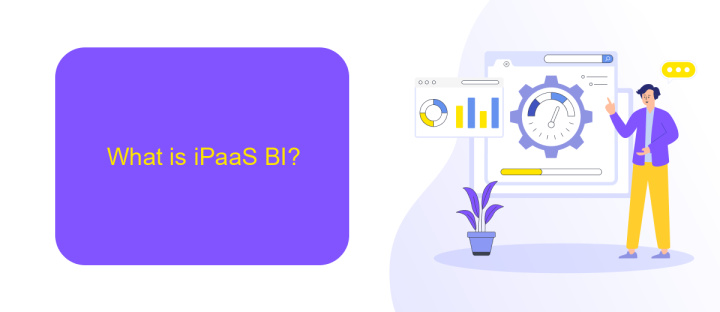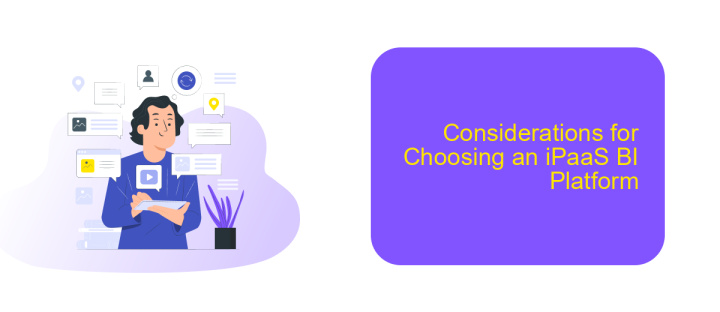iPaaS BI
In today's fast-paced digital landscape, businesses are increasingly turning to Integration Platform as a Service (iPaaS) coupled with Business Intelligence (BI) to streamline data management and enhance decision-making. iPaaS BI solutions offer seamless integration of disparate data sources, enabling organizations to gain real-time insights and drive strategic growth. This article explores the transformative potential of iPaaS BI in modern enterprises.
Introduction
In today's rapidly evolving business landscape, the ability to seamlessly integrate various data sources and applications is crucial for making informed decisions. iPaaS (Integration Platform as a Service) solutions have emerged as a powerful tool to address this need, offering streamlined integration processes and enhanced data management capabilities. By leveraging iPaaS, organizations can ensure that their business intelligence (BI) systems are fed with accurate, real-time data.
- Simplified integration of disparate data sources
- Real-time data synchronization
- Enhanced data accuracy and reliability
- Reduced IT overhead and operational costs
One notable service in this domain is ApiX-Drive, which facilitates the seamless connection of various applications and data sources without requiring extensive coding knowledge. This enables businesses to quickly set up integrations, ensuring that their BI tools are always updated with the latest data. By utilizing iPaaS solutions like ApiX-Drive, organizations can unlock the full potential of their BI systems, driving better decision-making and operational efficiency.
What is iPaaS BI?

iPaaS BI, or Integration Platform as a Service for Business Intelligence, is a cloud-based solution designed to streamline the integration of various data sources and business applications. This enables organizations to efficiently gather, process, and analyze data from multiple platforms in real-time. By leveraging iPaaS BI, companies can achieve a unified view of their data, leading to more informed decision-making and enhanced operational efficiency.
One notable service that facilitates these integrations is ApiX-Drive. ApiX-Drive allows businesses to connect disparate systems without the need for extensive coding or technical expertise. By using ApiX-Drive, companies can automate data flows between applications, ensuring that their BI tools have access to up-to-date and accurate information. This seamless integration capability is crucial for maintaining data consistency and reliability, ultimately empowering businesses to harness the full potential of their data assets.
Benefits of Using iPaaS BI

Implementing iPaaS BI solutions offers numerous benefits for businesses aiming to streamline their data processes and enhance decision-making. By leveraging these platforms, companies can achieve seamless integration across various applications, ensuring data consistency and accessibility.
- Data Integration: iPaaS BI platforms like ApiX-Drive facilitate smooth data integration from multiple sources, reducing manual efforts and errors.
- Real-Time Analytics: These solutions provide real-time data analytics, enabling businesses to make informed decisions quickly.
- Cost Efficiency: By automating data workflows, companies can save on operational costs and allocate resources more effectively.
- Scalability: iPaaS BI platforms are scalable, allowing businesses to adapt to growing data needs without significant infrastructure changes.
- Enhanced Collaboration: With centralized data access, teams can collaborate more efficiently, leading to better project outcomes.
Overall, iPaaS BI solutions like ApiX-Drive empower businesses to unify their data landscape, providing a robust foundation for advanced analytics and strategic growth. The ability to integrate diverse data sources seamlessly ensures that organizations can maintain a competitive edge in today's data-driven world.
Considerations for Choosing an iPaaS BI Platform

When selecting an iPaaS BI platform, it is crucial to consider several factors to ensure that it meets your business needs effectively. The right platform should simplify data integration, enhance data analysis, and support your overall business intelligence strategy.
First, evaluate the platform's compatibility with your existing systems and data sources. An ideal iPaaS BI solution should seamlessly integrate with various databases, cloud services, and on-premises applications. Additionally, consider the scalability of the platform to accommodate your growing data needs.
- Ease of Integration: Look for platforms that offer user-friendly interfaces and pre-built connectors. Tools like ApiX-Drive can significantly streamline the integration process without requiring extensive coding knowledge.
- Data Security: Ensure the platform provides robust security measures, including data encryption and compliance with industry standards.
- Cost: Analyze the pricing model to ensure it aligns with your budget. Consider both initial setup costs and ongoing subscription fees.
- Support and Training: Opt for a platform that offers comprehensive customer support and training resources to help your team maximize its potential.
Finally, assess the platform's analytical capabilities. A powerful iPaaS BI solution should offer advanced analytics, real-time data processing, and customizable reporting features. By carefully considering these factors, you can select a platform that enhances your business intelligence efforts and drives informed decision-making.
Future Trends in iPaaS BI
As the landscape of iPaaS BI evolves, several future trends are emerging that promise to reshape how businesses approach data integration and analytics. One significant trend is the increasing adoption of artificial intelligence and machine learning to enhance data processing and predictive analytics. These technologies will allow organizations to derive deeper insights from their data, facilitating more informed decision-making and strategic planning.
Another notable trend is the growing emphasis on low-code and no-code platforms, enabling even non-technical users to set up and manage complex integrations with ease. Services like ApiX-Drive are leading the way by offering user-friendly interfaces that simplify the integration process, making it accessible to a broader audience. Additionally, the focus on real-time data integration and analytics is expected to intensify, driven by the need for immediate insights in a fast-paced business environment. As these trends continue to develop, iPaaS BI solutions will become even more integral to the success of modern enterprises.


FAQ
What is iPaaS in the context of BI?
How does iPaaS improve data integration for BI?
What are the key benefits of using iPaaS for BI?
Can iPaaS handle complex data workflows and large volumes of data?
How can businesses implement iPaaS for their BI needs?
Do you want to achieve your goals in business, career and life faster and better? Do it with ApiX-Drive – a tool that will remove a significant part of the routine from workflows and free up additional time to achieve your goals. Test the capabilities of Apix-Drive for free – see for yourself the effectiveness of the tool.

